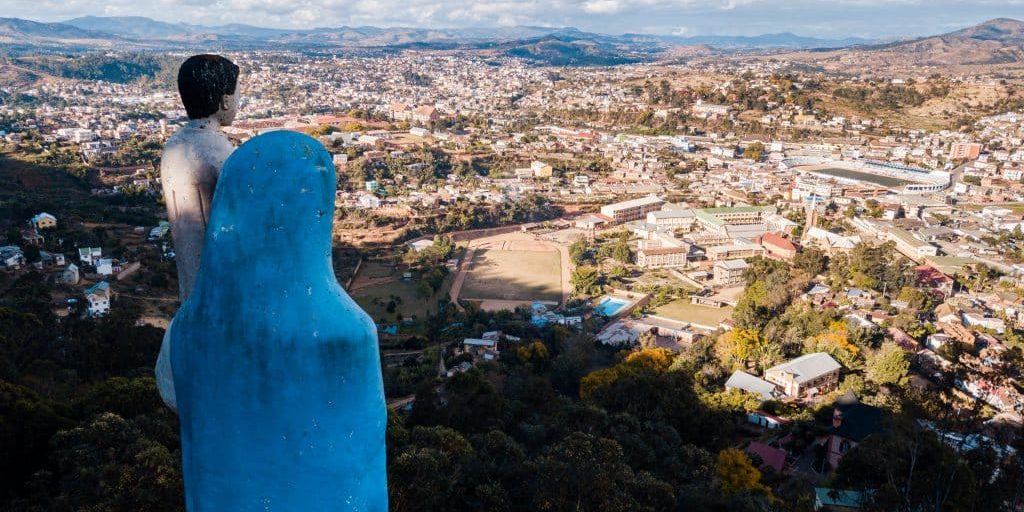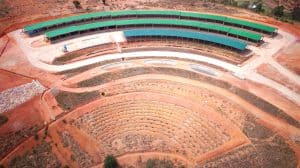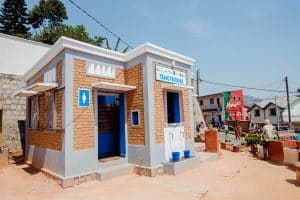Implementing a full FSM chain in Fianarantsoa, Madagascar
November 25, 2022

Since 2018, we have been working with the municipality of Fianarantsoa in Madagascar to implement a full FSM chain with a pro-poor focus to serve its population better. This project funded by Metropole de Lyon, SIAAP, AERMC, and SAUR directly contributes to the SDG6 access to “Clean water and sanitation” for all.

Although services and infrastructures for sanitation existed in Fianarantsoa before the beginning of our intervention, their condition was insufficient. Low managerial skills, lack of technical capacity and lack of tools and infrastructures were responsible for the low performance of the faecal sludge management chain. Our role in the 3F project and its follow-up, the Eaurizon 2025 project, is to identify the gaps and develop durable solutions.
During the first part of our intervention, we focussed on a few districts (Fokontany), where we constructed public toilet facilities, set up emptying and dumping services, reinforced the capacities of private operators and the municipality to improve the service level in the area, and tested monitoring and evaluation tools. After obtaining successful results, our intervention is now about to be scaled up to the rest of the city and we will also work on household toilet facilities.
A multi-level intervention to implement a sustainable FSM chain
- Material & infrastructures: We constructed and rehabilitated 10 public toilets. In the second phase of our intervention which started in October 2021, we are about to do the same with 13 additional toilets. We will also construct individual toilets to serve 2,400 poor households. In parallel, we achieved the construction of a treatment plant for faecal sludge on the outskirts of the city, which is already operational. The plant is meant to offer a safe place for the sludge deposition and avoid dumping, creating a major public hygiene risk. We will now focus on finding ways to improve improving pit latrine emptying facilities, and the sludge treatment process and increase the safety of the final product to make it marketable (e.g. for agricultural use), thereby contributing to the circularity of the FSM chain.

- Operational & organisational: To ensure the quality and sustainability of the FSM infrastructures and services, we organised and capacitated public and private actors involved in the chain. The management of the FSM services (toilets, collection, transport and treatment) has been entrusted to private operators who also followed technical and managerial trainings. Supervising the chain via regular monitoring and evaluation of the services is the municipality’s responsibility. The city of Fianarantsoa also has the responsibility to see that public rules and regulations (e.g. prohibition of urinating in the street) are being enforced. While we are now extending the FSM chain in new areas of the city, we will train and reinforce the capacities of new actors.
- Institutional: Since 2018, we have supported the city of Fianarantsoa to update, and create policies and regulations that are applicable, enforceable and contribute to improving public hygiene and health. Some of the existing texts were not clear and therefore, not enforceable. We worked with the municipality to improve them and create new rules facilitating the implementation of the FSM chain. For instance, it is now forbidden to request services of informal manual emptiers, who are not licensed and dispose of faecal sludge in the environment. Only approved businesses, that received training and whose work is monitored are allowed to collect, transport and treat sludge. It ensures good working conditions and proper management and treatment of the sludge. Finally, we established communication campaigns with the municipality to promote public hygiene and introduce new services to the population.
Building a strong FSM chain is a long-term work with multiple actors from the public and the private sectors. Infrastructure and services needed to be set up in Fianarantsoa and a long-term strategy and management structure had to be established. For that, we developed business cases for each type of service, provided technical trainings and reinforced the capacities of all actors from a managerial perspective. Now, our goal is to scale up the results obtained in a few Fokontany (districts) to the whole city and to keep on supporting the public and private actors until we are convinced that the ecosystem is fully stable and self-sustaining.
Watch a video about the results of our intervention in Fianarantsoa during the 3F project.
Watch it here in English and here in French.
